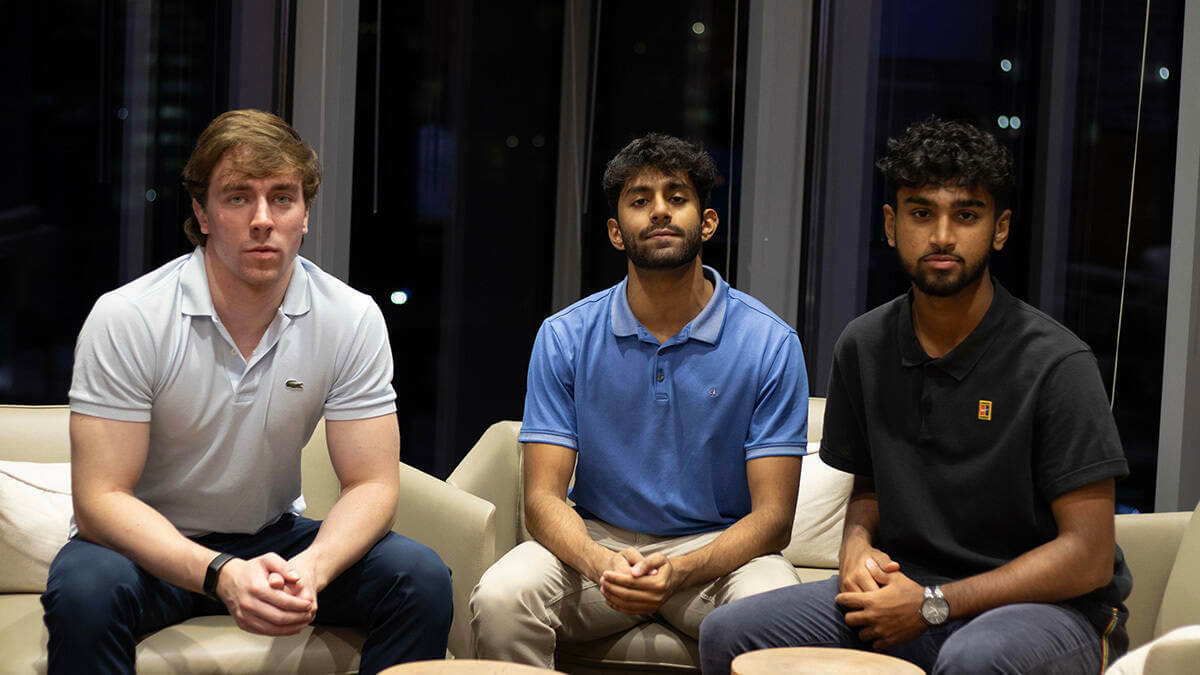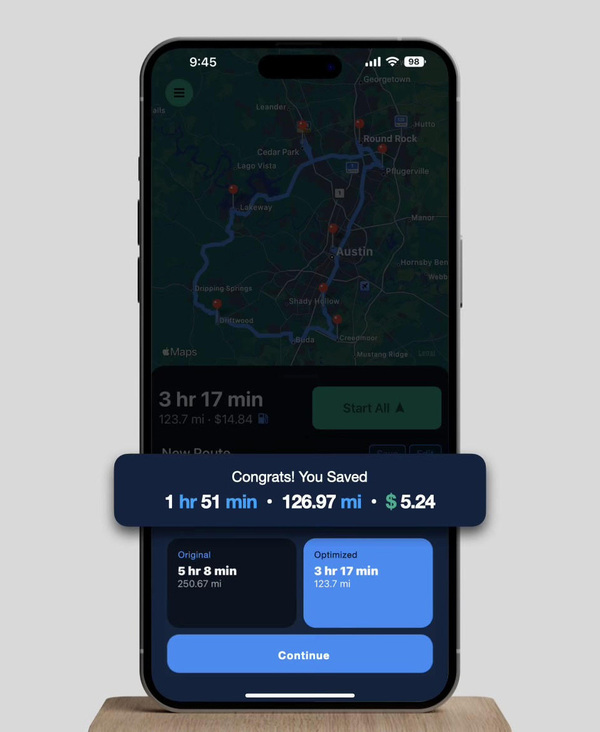Notre Dame undergraduates create route optimization app to help reduce fuel costs, travel time and carbon emissions

During the Christmas season, consumers are forecast to spend more than $220 billion in e-commerce alone. And with half of all shoppers making most or all of their purchases online, the “most wonderful time of the year” is also the busiest for delivery drivers.
But this year, those drivers have a new tool to help them make every minute — and every mile — count.
Notre Dame undergraduates Luke Blazek and Brian George, together with their childhood friend Tom Vazhekatt, a student at the University of Texas at Dallas, have launched an app called Routora that uses artificial intelligence to provide faster, more efficient multi-stop routes.
The app, which integrates seamlessly with Google Maps, Apple Maps and Waze, not only saves drivers’ time and money, but also reduces their carbon footprint. It is targeted toward people running everyday errands and independent drivers for companies like Amazon, Walmart and Target — who represent an underserved population, according to Blazek and George.
“E-commerce has grown significantly since the pandemic, and the gig drivers who enable that convenience for all of us are essentially independent contractors,” said Blazek, a junior economics major. “They have to pay for their own fuel and car expenses, and they’re the ones who are hurt the most by these inefficiencies because it eats into what they make at the end of the day. We wanted to come up with a solution to help the people whose livelihood depends on it.”
The idea began with Vazhekatt, a computer science major who created a Google Chrome extension and brought it to Blazek and George. The three students then founded their startup in summer 2022 with help from Notre Dame’s IDEA Center and launched the Routora app for iOS and Android platforms at the end of September 2023.

With no money spent on marketing, Routora has now amassed more than 30,000 drivers from over 90 countries who have saved a combined 1.7 million miles on the road, $300,000 in fuel costs and over 600 kilograms in carbon dioxide emissions — the equivalent of saving 31,000 trees.
The IDEA Center has been instrumental in that journey not only by providing the students with funding, but by connecting them with attorneys who helped them incorporate and startup coaches who guided them through the early stages of entrepreneurship. The students also found support and mentorship through the Notre Dame alumni network and faculty.
“From day one, Notre Dame and the IDEA Center have been there helping Brian and me to take what was a pie-in-the-sky idea and turn it into a formal business,” Blazek said. “That’s honestly made all the difference in getting where we are today.”
George, a junior majoring in history and finance, is also participating in the College of Arts & Letters’ Sheedy Family Program in Economy, Enterprise, and Society — which encourages students to find the deeper meaning in business by integrating the liberal arts. In addition to coursework, the program includes networking events and workshops with business leaders.
“The Sheedy Family Program has been key in shaping Routora's decision-making framework,” George said. “The program’s emphasis on collaborative dialogue and exploration has given us invaluable insights. We’ve also connected with a broad spectrum of professionals and learned from their experiences and guidance when charting unknown territories.”
Routora broke into the top 100 transportation apps within the first week after its launch, and the students are currently working on an update that will allow it to work directly with software used by delivery drivers for Amazon and Walmart.
While the collaboration originated in the students’ hometown of Dallas, George said it has “truly been shaped at Notre Dame,” where he and Blazek have been inspired by the University’s focus on sustainability, equitable access to technology and improving people’s lives.
“The problem Routora solves is a testament to the Notre Dame ethos of being a ‘force for good’ in the world,” he said. “Our story is not just about Routora, but about how institutions like Notre Dame can shape and uplift entrepreneurial dreams. What started out as a dorm room side project has become something greater than any of us could have imagined.”
Latest University News
- Notre Dame elects two new TrusteesTwo new Trustees — John F. Crowley and Danielle Walker Merfeld — have been elected to serve on the University of Notre Dame’s Board of Trustees effective July 1. …
- Alumni Association awards 2025 Lennon Life PrizesThe Notre Dame Alumni Association recognized nine alumni clubs as recipients of the Lennon Life Prize — part of the Chuck and Joan Lennon Gospel of Life Initiative, a set of programs focused on encouraging the University’s dedicated network of clubs to uphold the value of life at all stages.
- Jenkins Center for Virtue Ethics receives grant to advance love-based ethical frameworkThe University of Notre Dame has received a $10 million grant from the John Templeton Foundation to support a project titled Love and Social Transformation: Empowering Scholars and Social Innovators to Develop the Love Ethic.
- Notre Dame honors Carmi and Chris Murphy with 2025 Sorin AwardIn recognition of their contributions to the University of Notre Dame and service to the South Bend community, Carmi and Chris Murphy were presented with the 2025 Rev. Edward Frederick Sorin, C.S.C., Award on May 31 at the Alumni Association’s annual reunion celebration.
- In Memoriam: Sriram SomanchiSomanchi was a widely respected teacher and scholar whose research broke new ground in the academic landscape by drawing on social science and statistical machine learning to develop and deploy methods that bridge these related but distinct disciplines.
- Notre Dame announces next step for emerging tech and talent district in downtown South BendThe Tech and Talent District, a keystone of the city of South Bend’s Downtown South Bend 2045 plan, has advanced a step closer to implementation via a partnership between the University of Notre Dame and Ancora to pursue the development of the first phase of the district.












